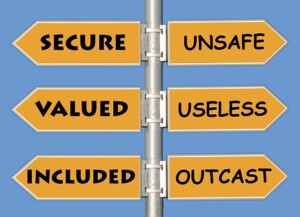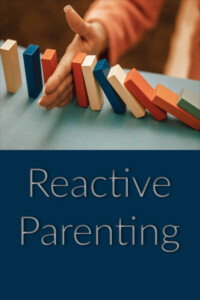Reactive Parenting
 Childhood vows
Childhood vows
I snapped out the light and pulled the covers over my head. “When I’m a mom, I’m never going to make my kids go to bed when they are in the middle of a good book. And,” I added to myself, “I’m not going to tell them that reading with a small light is hard on the eyes.”
You can be sure I had every intention to fulfill that promise, if I ever had kids. That’s as far as it went. By the time I became a mom, I knew kids shouldn’t stay up all night. I also knew that reading in dim light for hours puts a strain on the eyes. Oh, but when I was the child, it was a different story.
Each of us brings our own childhood experiences to our family. Sometimes we base how we raise our kids simply on our own raising. We do this, not because we want to model our raising, but because are are doing reactive parenting. Other times, we see detrimental parenting in someone and throw out the baby with the bathwater. We are bound and determined we will never parent their way. So, we begin reactive parenting.
We make decisions, just to be different, in protest of what we consider poor parenting. We should, instead, make decisions based on what is best for our kids. Our rules should be based on the outcome we want down the road. Instead, we simply take a deliberate route away from our raising. Our parents were too strict, too flaccid, too uncaring, or too compromising. We let their failures be our measure by which we parent. That's reactive parenting. Share on X
Parenting based on the best
In our parenting, the decisions we make should be based on what is best for our child. Do we want them to be responsible adults when they leave our nest? Should they be able to maintain a budget and care for a house when they fly away? If so, then we need to put parameters in place to help them learn money management and responsibility for house maintenance.
Our focus must be on the future of our children, not on the past we experienced as kids. Our focus must be on good, wholesome choices (both physical and spiritual) and not based on what we determine to be bad parenting.
 Reactive parenting
Reactive parenting
My friend’s parents were strict on dinnertime rules. Everyone had to be at the table at 6 PM. When he got married, he decided there’d be no set time for meals. His wife had to work around his schedule and never knew what to expect – all because he was not going to be like his parents. While he felt his parents were controlling, he also exhibited control. By never having a set time, he was controlling in his own way.
How about the mom who allows her kids to have unlimited sweet tea or soft drinks, because she was never allowed to have it as a child. She’s using reactive parenting. Her reason for allowing her kids to drink what they want is not to help them develop good health habits. She merely wants to be different from her parents, who she felt were too strict. She wants her kids to like her even if what she allows are not healthy options.
There are other Moms who purchase candy for their children every time they go to the store – because their mothers never, ever bought candy from the store. That’s reactive parenting, choosing parenting habits in reaction to one’s upbringing rather than choosing habits that are good for their children.
Fathers face the same challenge. Some do not make their kids help with housework or house maintenance since they felt they had to work too hard as a child. They are not about to make their kids work like they did, so they choose reactive parenting. Instead of looking at the bigger picture and recognizing that kids do need to learn responsibility, they fail to instill that important virtue – all because they do not want to be like their folks.
Combating reactive parenting
For a starter, we must recognize if our parenting is reactive. There are questions we can ask to help us differentiate our type of parenting.
-
- Are the choices you make in your parenting based on Biblical guidelines?
- Are the parameters you set for your kids based on an end goal of their becoming responsible adults or based on not doing it the way someone else did?
- Do you compare other parents or your own upbringing and choose a deliberate step in the opposite direction because you are determined to not be like them?
- Do you choose being a friend to your child over being his parent?
Be honest with yourself. You know the reasons you do what you do. Sometimes doing the opposite of your parents is a good thing, but your focus needs to be on the correct reason behind your expectations and not simply being different from your parents. If your focus is on being different from someone, you’ll lose sight of the end goal.
Evaluate how your kids are doing with responsibility, integrity, helpfulness. Figure out if their lack of cooperation is their own laziness or because of your reactive parenting.
Be willing to change tactics when necessary. Set standards for your kids and your home based on what is healthy, good, and right. As a result, you won’t need to compare yourself with others for you will have won the battle with reactive parenting.

Photo credits: pixabay.com





